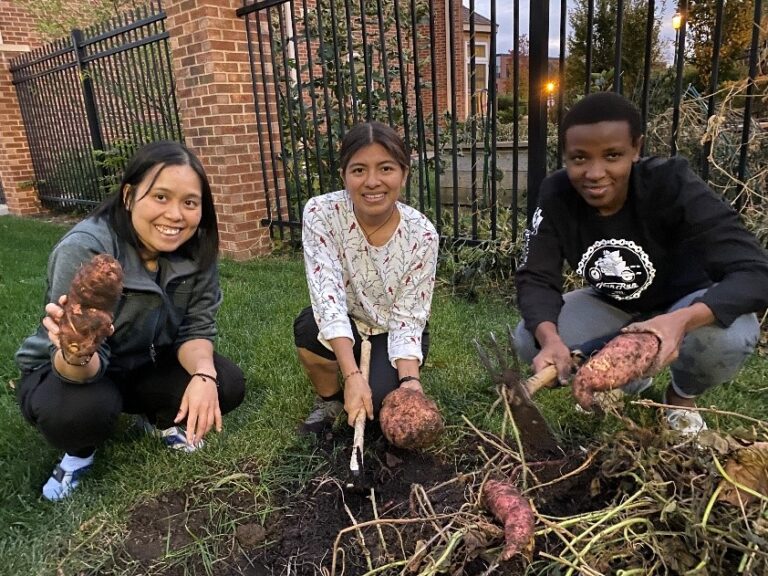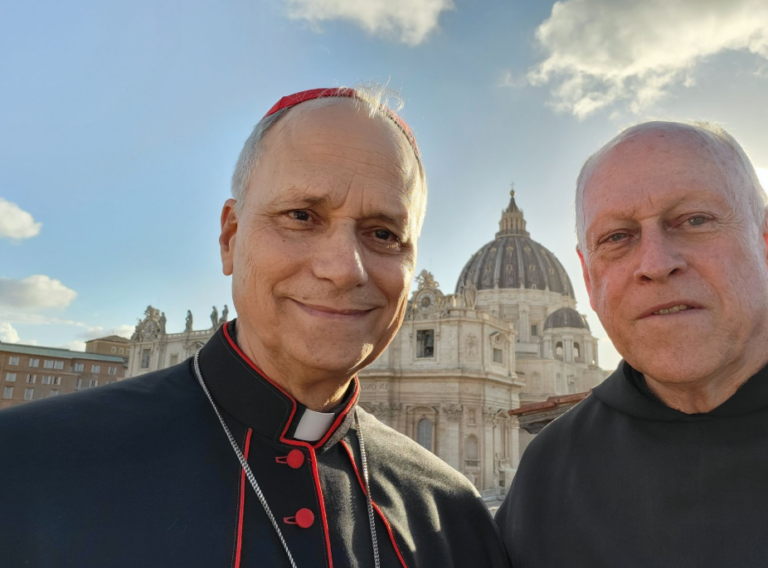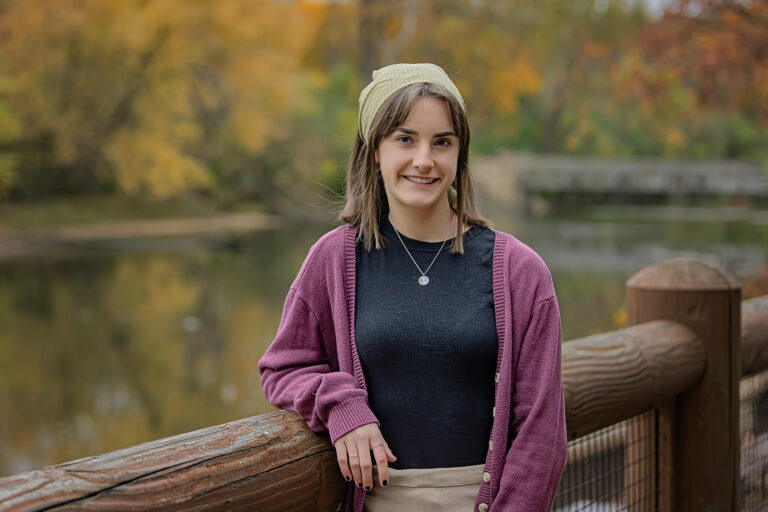“Then the angel said to the women in reply, “Do not be afraid! I know that you are seeking Jesus the crucified. He is not here, for he has been raised just as he said. Come and see the place where he lay.”
–Matthew 28:5-6
To wrap up Women’s History Month, we’re shining the spotlight on women who have made a difference in their parishes, communities, and dioceses by caring for God’s creation. In this blog, we’re highlighting the efforts of lay and religious women and their organizations, as well as their creation care efforts. Read more about these women and their organizations, who have made our work at Catholic Climate Covenant possible, and learn more about how you can support our work, too!
Daughters of Charity of St. Vincent de Paul – Province of St. Louise
The Daughters of Charity of St. Vincent de Paul is an international community present in over 95 countries on five continents. The Province of St. Louise is located in St. Louis, Mo. They are one of the women’s religious organizations that have set their sights on environmental work.
Sister Mary Jo Stein, DC, one of the co-leads for the province’s Laudato Si Action Platform, shares more about the religious organization’s environmental goals.
“Care of our common home was included as one of the primary goals in our last General Assembly (general chapter) in 2021,” Sister Mary Jo said. “Provinces throughout the world are engaged according to the realities of poverty in their region.”
The Daughters of Charity’s charisms are serving the poor, who are disproportionately affected by climate change.
“We are given to God in community in service of Christ in persons living in poverty,” Sister Mary Jo said. “We respond to urgent needs according to the realities in each region.”
Sister Mary Jo shared some of the creation care and environmental activities that the Daughters of Charity of St. Vincent de Paul, Province of St. Louise, are involved in.
“We are in our third year of our Laudato Si’ Action Plan, which includes education, prayer, and action to address the cry of Earth and the cry of people living in poverty,” Sister Mary Jo said. “We engage our local communities of Sisters in living integral ecology (in) our ministries with youth, schools, neighborhoods, health care, and parishes.”
Sister Mary Jo said the Daughters of Charity assisted with Elizabeth Seton High School in Bladensburg, Md.’s Laudato Si’ native tree planting initiative in 2023 and the development of Stillmeadow Peace Park in a flood plain in a low-income urban neighborhood in Baltimore.
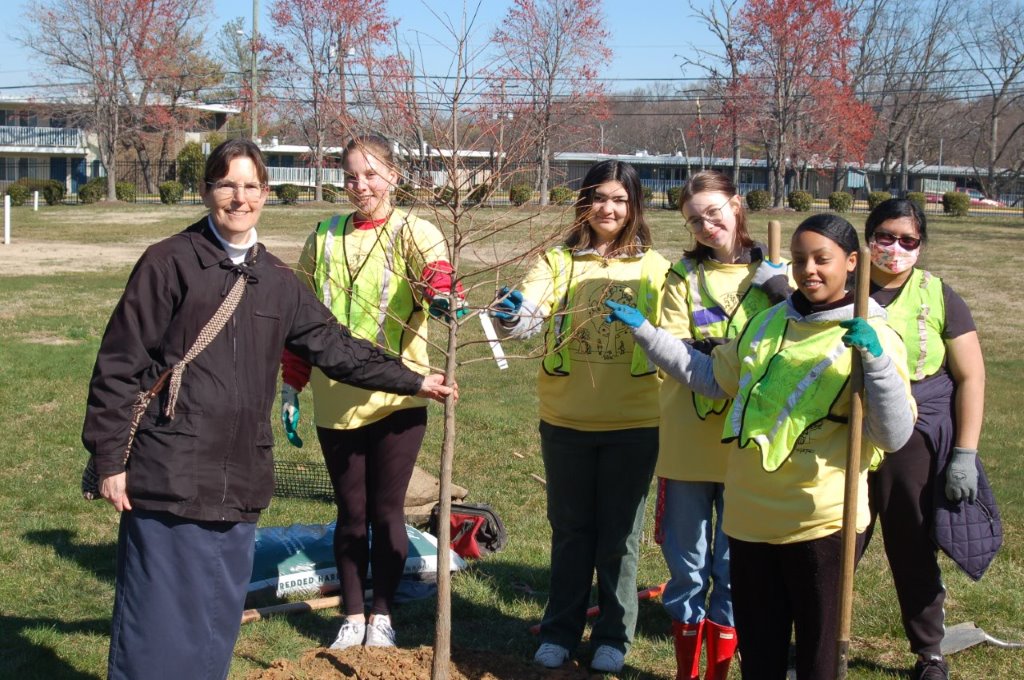
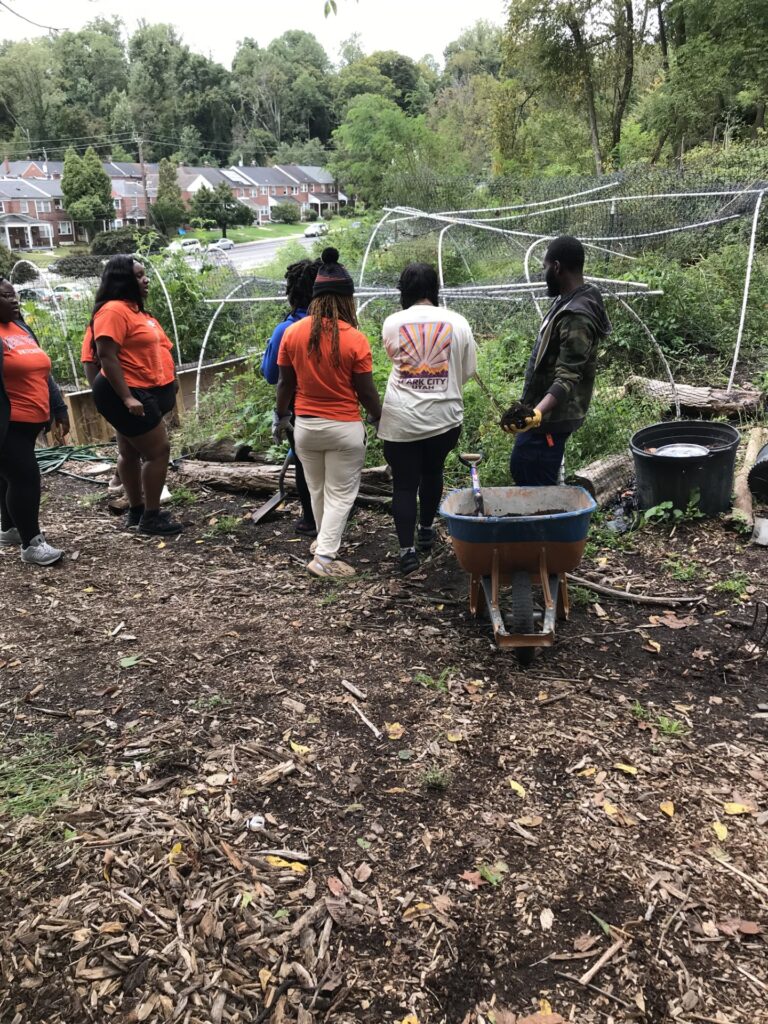
The Daughters of Charity have also started a collaboration with Mount St. Mary’s University in Emmitsburg, Md., to do a two-year biodiversity study to suggest better land management practices on land at the Shrine of St. Elizabeth Ann Seton.
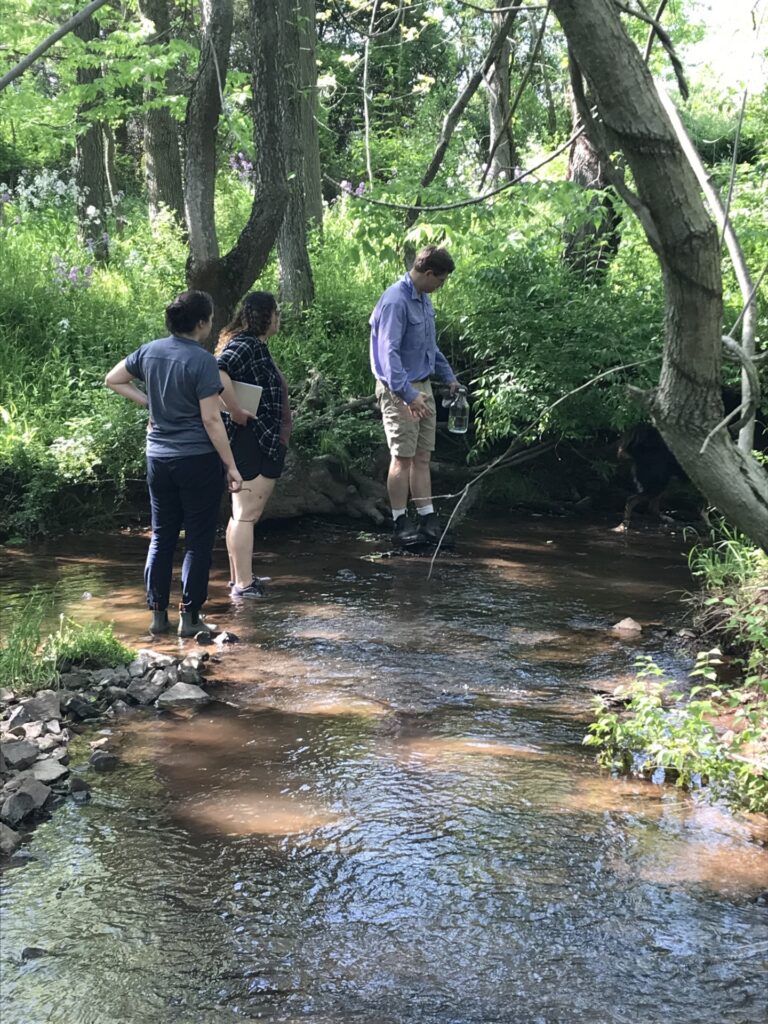
This past February, Sisters in Evansville, Ind., held a postcard campaign advocating for a bill that would allow community solar projects to be established in the state.
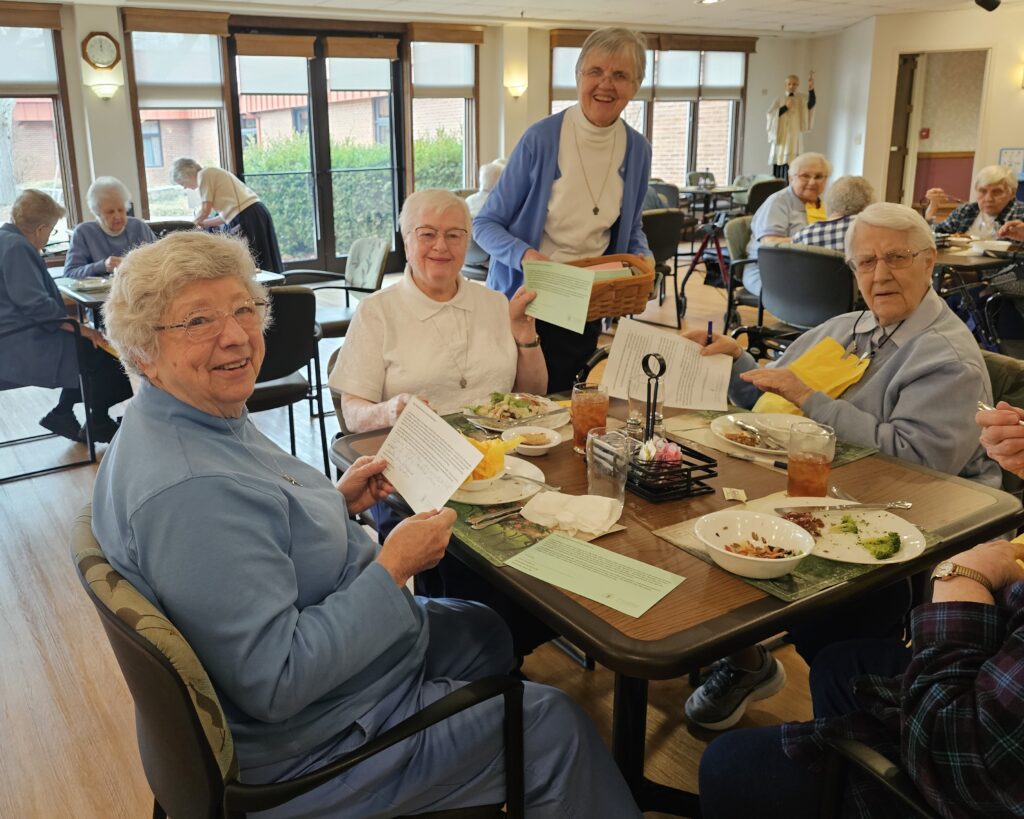
“We do additional advocacy on local and national levels to support environmental legislation, and we also pray individually and in the community for those most effected by the climate crisis,” Sister Mary Jo said.
Sister Mary Jo explained how creation care is a way to live out the Catholic faith.
“Jesus invites us to care for the least, and we know that climate change has the most impact on those on the periphery,” Sister Mary Jo said. “We contemplate Christ present in those who are poor, and the poverty of Earth is a form of poverty that we are now invited to contemplate and serve. We seek to collaborate with others in caring for those most affected by the climate crisis.”
Sister Mary Jo offered a word of advice to Catholics everywhere who are working for climate action.
“We can’t do everything, but everyone can do something. There is more and more momentum, and we need to join our efforts with other Catholics and with other people of other faiths and goodwill to address the climate crisis,” Sister Mary Jo said. “The Catholic Church is the biggest landowner on a global scale, and we have the opportunity and responsibility to care for our common home so that all of God’s creation can have what is needed to live.”
Franciscan Sisters and young lay Catholics
Patricia Tomich is the Assistant Associate Director of the Franciscan Sisters of the Sacred Heart in Frankfort, Illinois and serves on their Laudato Si’ committee. Additionally, she teaches at an all girls Catholic high school. She has seen the Franciscan Sisters’ work in the environment, and is looking for ways to get youth involved as well.
Throughout March, Tomich wrote weekly columns for the community newsletter called “Did you know?” for the Franciscan Sisters, highlighting the importance of women in the order doing environmental work.
“A Google search using ‘Franciscan Sisters and environmental sustainability’ yielded thousands of results dating back to 2010,” Tomich wrote in one column. “Just as Catholic Sisters contributed greatly to the building of educational and health care systems, their energies and resources are on the frontlines of environmental initiatives. They are leading the Green Movement speaking and acting on behalf of God’s Creation. Franciscan sisters are planting seeds all over the world.”
Tomich spoke more about the role of women’s religious organizations in aiding social ills, and how the environment is the next big project for many women’s religious organizations.
“We know from the history of Catholic sisters what they’ve done in our country in establishing healthcare and education and all different kinds of social justice programs to help lift people, especially the poor,” Tomich said. “Now they’re reimagining — what is their call, what is their vocation, what are they called to do? They’re called to birth this new creation.”
Tomich’s columns highlight some of the many ways that Franciscan Sisters are caring for God’s creation.
“Catholic Sisters are growing prairie gardens to attract pollinators, designing rain gardens to filter water to refresh aquifers,” Tomich wrote. “Bee colonies are found on motherhouse grounds as sisters are fostering ecosystems for pollinators. Yes, there are Franciscan Sisters who are beekeepers.”
This is in addition to work in Latin America and Africa, which Tomich also points out in her columns.
“Franciscan Sisters are involved in tree planting initiatives to slow down deforestation in many regions of Latin America and Africa, and their motherhouse grounds as well,” Tomich wrote. “These Sisters are also teaching others about sustainable agriculture and permaculture both at home and abroad. Moreover, Catholic Sisters have diversified investment portfolios pressuring corporations to change business practices, products, and policies to align with the vision of Laudato Si’. Franciscans are influencing legislators in state capitals and in Washington D.C., advocating on behalf of the Planet.”
But Tomich has started thinking about the involvement of women in creation care beyond the Franciscan Sisters — starting in her own high school and the local community.
“How do we get young people involved in caring for creation?” Tomich said. “I want to get these girls, at least a couple of them, involved in a leadership committee. We have an ecology club for what kids are doing around the school.”
Tomich is also working in her parish and community to increase creation care awareness and start creation care activities.
“We exchange a lot of information at the policy level and legislative level, asking legislators to frame bills so that they’re more sustainable,” Tomich said. “The more we build this network, and provide that energy and encouragement … there’s a shift that’s taking place. I would like to continue looking at this with young adults … and building a base for getting them involved.”
Sisters of Charity of the Incarnate Word
Many women’s religious organizations are small but mighty. One such organization is the Congregation of the Sisters of Charity of the Incarnate Word, located in Houston, Texas. Founded in 1866 by French sisters to assist with medical needs in Texas, the Sisters of Charity of the Incarnate Word has its roots all over the world in helping those in need of healthcare and those who are in poverty. They aspire to be the manifestation of Christ’s presence in the world.
Sister Ricca Dimalibot, CCVI, with the Sisters of Charity of the Incarnate Word in Houston, shares more about the creation care efforts of the Sisters.
“We try to be more intentional about our presence in the world,” Sister Dimalibot said. “If Christ cannot be here in body, we are his spirit working in the world.”
Sister Dimalibot said the order reaffirms the importance of creation care in the Chapter statement during their meeting every four years.
“In 2018, we put creation care formally into our chapter direction statement to make it more intentional,” Sister Dimalibot said. “In 2022 … we put it back again, but this time we said that our congregation wanted to be part of the Laudato Si’ Action Platform.”
Sister Dimalibot explained the decision came from having so many sisters in climate-vulnerable places around the world, where creation care is part of the culture. She said in the first year of the LSAP participation, Kenyan sisters of Charity of the Incarnate Word planted 2,000 trees, not counting trees planted in Central America, Ireland, and the U.S. In the last two years, Kenyan sisters planted another 1,300 trees. Volunteers, families, and students have gotten involved with the religious organization’s efforts around the world.
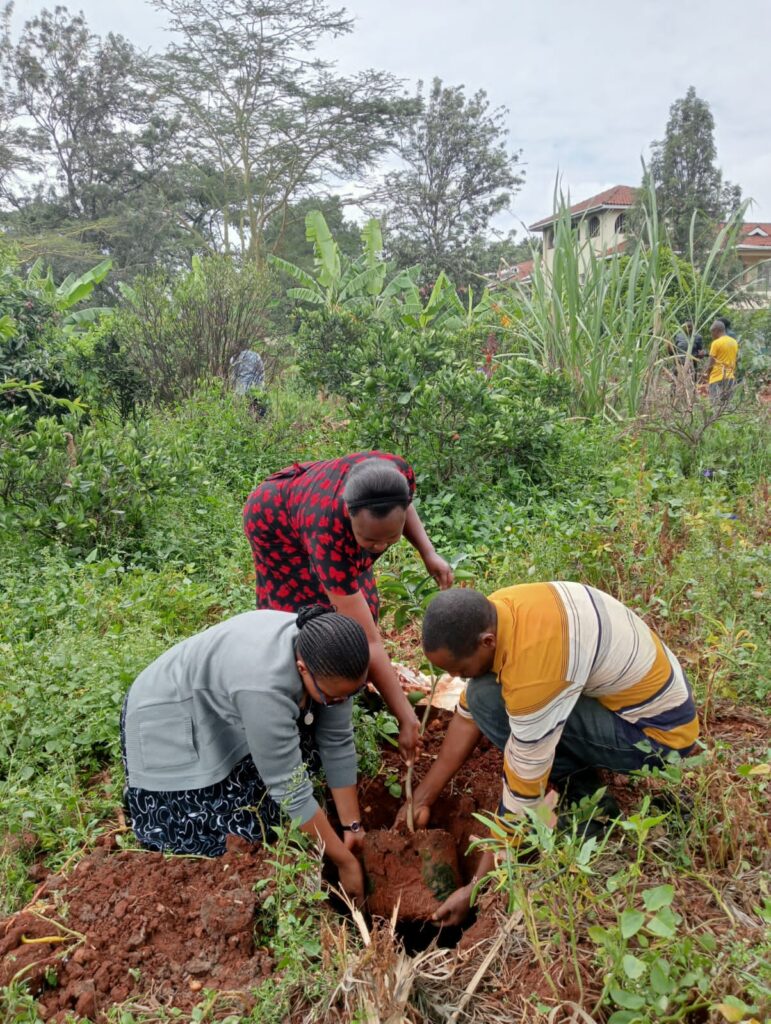
(Courtesy Sister Ricca Dimalibot)
“We also help a lot of climate refugees because we’re in Texas. There are a lot of migrants here leaving their country because their crops have died, and they don’t have the means to support their livelihood,” Sister Dimalibot said.
The order celebrates environmental days such as Earth Day, purchases hybrid or electric vehicles, encourages creation care organizations in their affiliated schools, composts, makes sure their coffee is fair trade, and avoids single-use plastics.
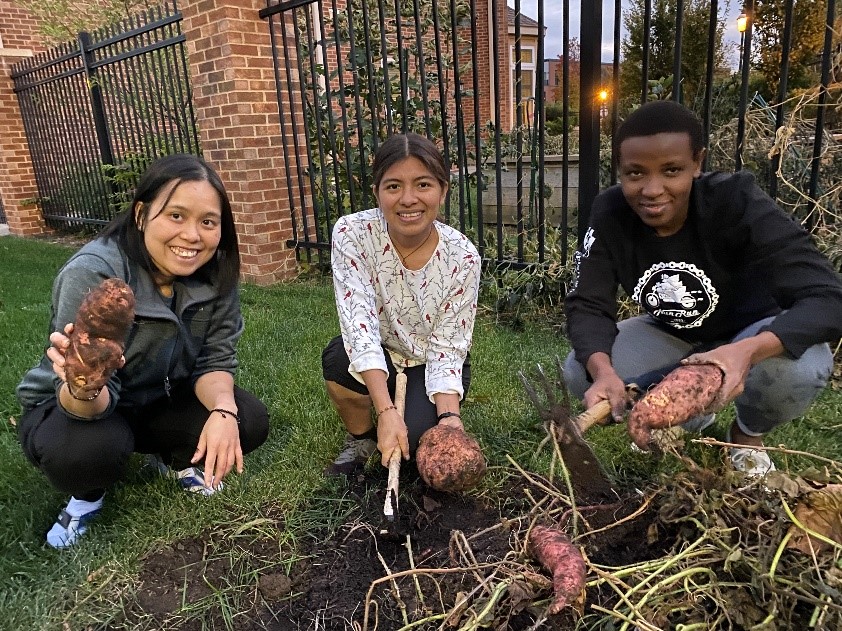
The order hosts creation care-themed retreats and special creation care prayer services.
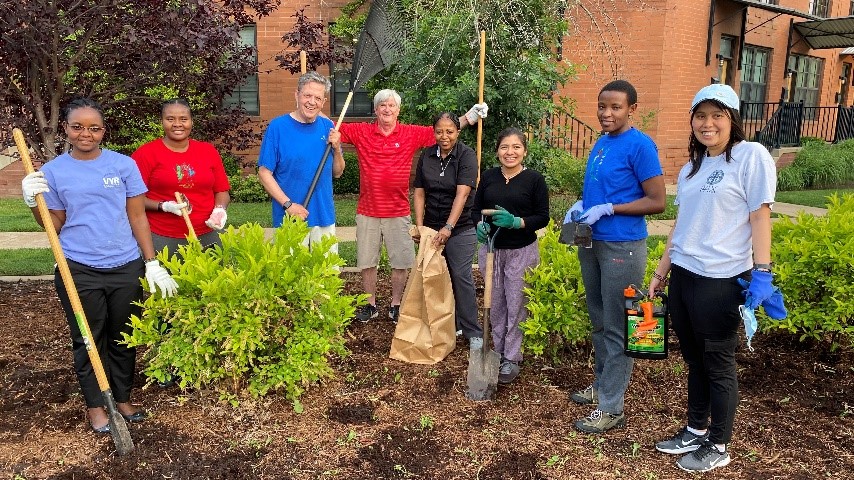
In 2023, they had the first green Mass in the diocese. They also provide grants to organizations that care for the poor and the environment, as well as make sustainability investments. Even the lights on the convent’s property are LED. Windows are double-paned, and many convents in Kenya use solar panels. The Kenyan and Central American convents also grow and consume organic foods in gardens tended to by the sisters, watered with rainwater that has been collected.
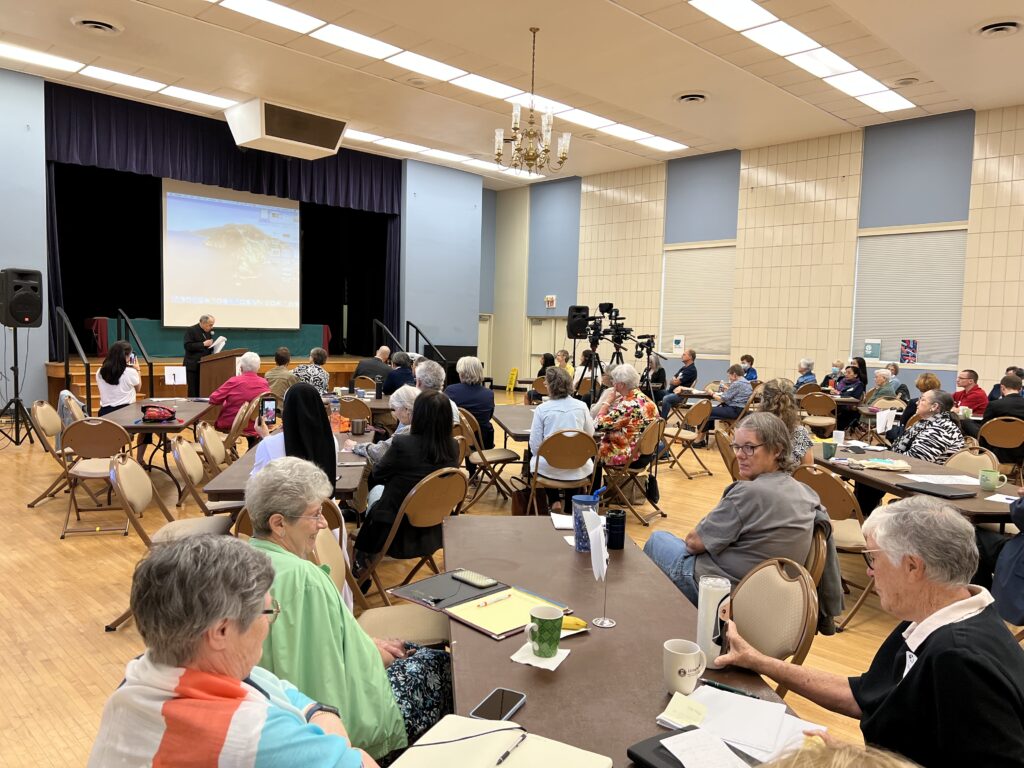
Sister Dimalibot shared how caring for our common home is living out her Catholic faith.
“How can you not see the presence of God in everything? How can I not see the Creator, who intentionally made our planet, and made it so beautiful and intricate?” Sister Dimalibot asked. “God is so intimately united with me. I have a body, and I have a soul, and it’s put together by a loving God. … I’m a family practice doctor. If you have just a little bit off in your genes, or in your oxygen, or your blood, it leads to so much chaos. The fact that all of us were wonderfully made and ticking, but … the effects of our climate, and how we’re abusing our bodies — throws off a wonderful creation.
“It made me realize just how precious our bodies are, and how wonderfully made all of us are. It’s not just the animals and the trees and the human beings, but it’s everything beyond our universe. And now we’re able to see pictures … of how much more there is to our universe than we even know just living on Earth. When it comes to my Catholic faith, I just know it in my bones. … Shame on me if I don’t respect it and honor it.”
Sister Dimalibot offered words of encouragement to Catholics working on creation care based on her own experiences and challenges.
“Most of the things that we do seem like they don’t amount to anything because they seem so little … I will never know the effect of what I’m doing, but the fact that I’m doing it is enough reason to do it because I’m doing what God put me on this earth to do,” Sister Dimalibot said. “No matter how small my contribution is, or how hidden it is … the fact that it is being done for God sanctifies everything. Even in the midst of discouragement and chaos … this transforms me as a person, and knowing that I’m doing it for God gives me purpose and meaning in life.”
***
This Easter Monday, it’s worth remembering that the first people God trusted to discover Jesus’ resurrection were women. Throughout history, women have led the charge in caring for their communities, homes, families, and have played key roles in the growth and redemption of God’s creation. While Women’s History Month may be over, it’s important to remember year-round the important contributions that lay women, women religious, and their organizations make to the growth, preservation, and redemption of creation and our common home. You can support Catholic Climate Covenant’s work, too, by joining our movement or making a donation.

